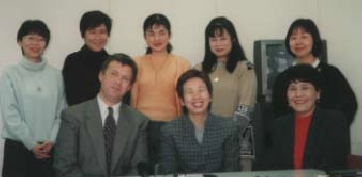Close-up
"My dog and I are from the same town"
This interview was conducted and edited by the students of the course, "Thrilling Experience of English" Course by PARKWAY sponsored by the International Exchange Square in Kure.
Christopher Bagnall is from Banbury, Oxfordshire, England, which is famous for many nursery rhymes. PARKWAY interviewed him in 1989. He came back to Kure and is now teaching English at Takeda School. He lives halfway up Mt. Haigamine with his Japanese wife and their baby girl and a dog.

Chris and interviewers: (from left) Michiko Nitta, Junko Yamada, Shizuko Kashima, Noriko Kisaka, Yumiko Kusumoto, (front) Chris, Reiko Iwaoka and HIroko Fukuhara
Q: Last time you said you would participate in the Biwako Triathlon. How did it go?
A: I was qualified for the World Championship in 1988. I was very pleased then. During the Biwako Triathlon I lived with a typical Japanese extended farming family right in the countryside. The family was very kind and we used to eat a lot of raw Daikon (Japanese radish) together at every meal. It tasted strong. Now we have a bit of garden here. Last year I was busy putting in new plants- vegetables-especially Daikon in it. But this year, I'll be too busy with our one-month-old baby, Martha. She also has Chinese characters for her name.
Q: What language will you speak to your daughter?
A: This is a big question for many mixed marriage couples. Obviously the ideal is she speaks both Japanese and English. It's a question of the time of exposure. If Martha is exposed to enough Japanese, then she will speak Japanese. If to enough English, English. It's a bit of a worry because I spend most of my time in school and I only see her for a short time. So I have to do a lot of speaking. Different people have different opinions. Some people say if a child is exposed to two or three languages, the child will learn two or three languages. Others say the child will learn only a third of each language and so will not learn any language properly. I say it depends on the child, on individual circumstances. Some children seem to have more ability in a certain area, for example, languages, arts or sciences. So I think it depends on the child. It's something that is a worry but also it's something there is no point worrying too much about. But we have to bear it in mind. I think my wife feels the same way as I do.
Q: What language do you speak with your wife?
A: I usually speak English but not always. My wife uses very difficult Japanese when she doesn't want me to understand her. It's very cruel. I can use very difficult English as well. That's my life, isn't it? When we have a fight, I just speak to my dog.
Q: What kind of dog is it?
A: A Yorkshire terrier from Huddersfield, Yorkshire, where I used to live. My dog, Wizlee and I are from the same town, so we understand each other. In England I had big dogs and I couldn't understand why my best friend loved Yorkshire terrier, a toy dog, in those days. But now I can understand him. A Yorkshire terrier is a wonderful dog!
Do you have any activities outside the class?
A: Yes, I have English Club, and they do a speech contest. To be honest, I'm hoping to do the running club again. My hurt ankle prevents me from doing triathlon now. But I'd like to do sports with my students for some reasons. Sporting tasks are very important way to communicate for some students who don't speak so much in class. When they are playing soccer or running, they often speak to me. In the same way, a lot of students try to speak to me when passing in the corridor. Some students make an effort to exploit the corridor time. They can communicate more frankly outside the class. It's a well rounded curriculum. So I'm hoping to enjoy sports with them. I'd like to do swimming club too, but it's difficult to speak when you are swimming, isn't it?
